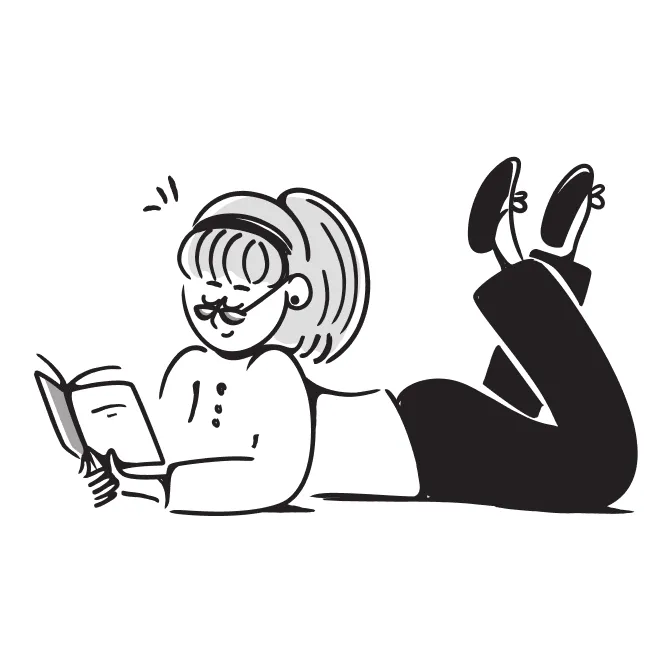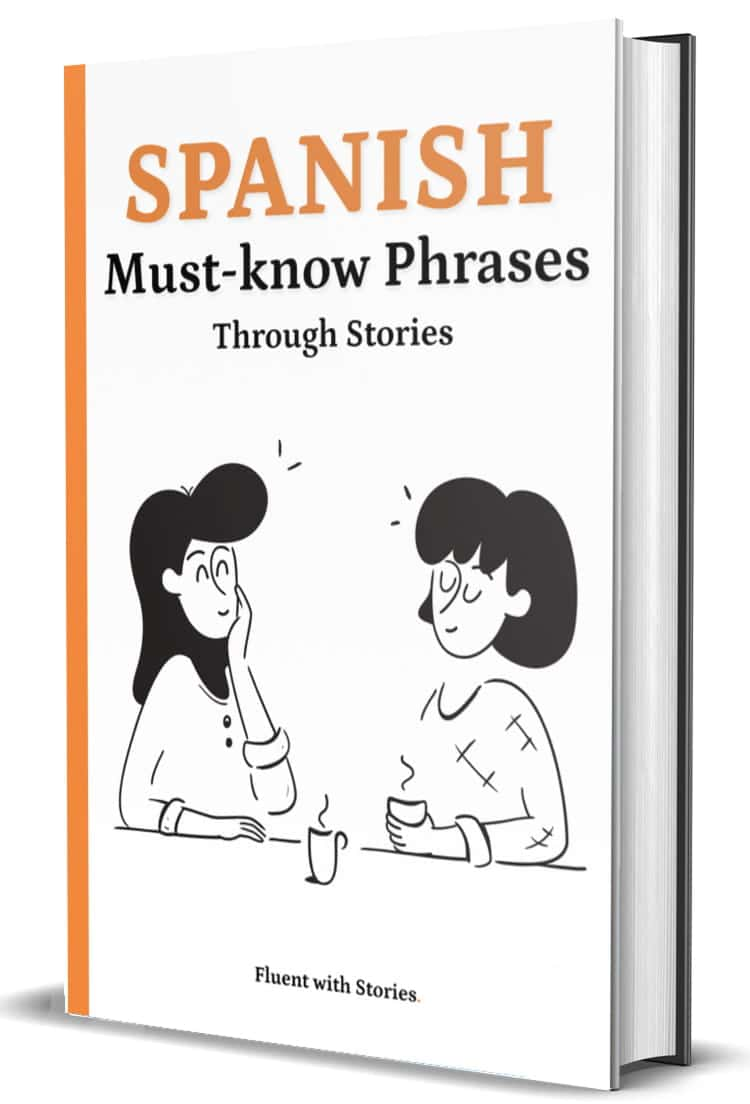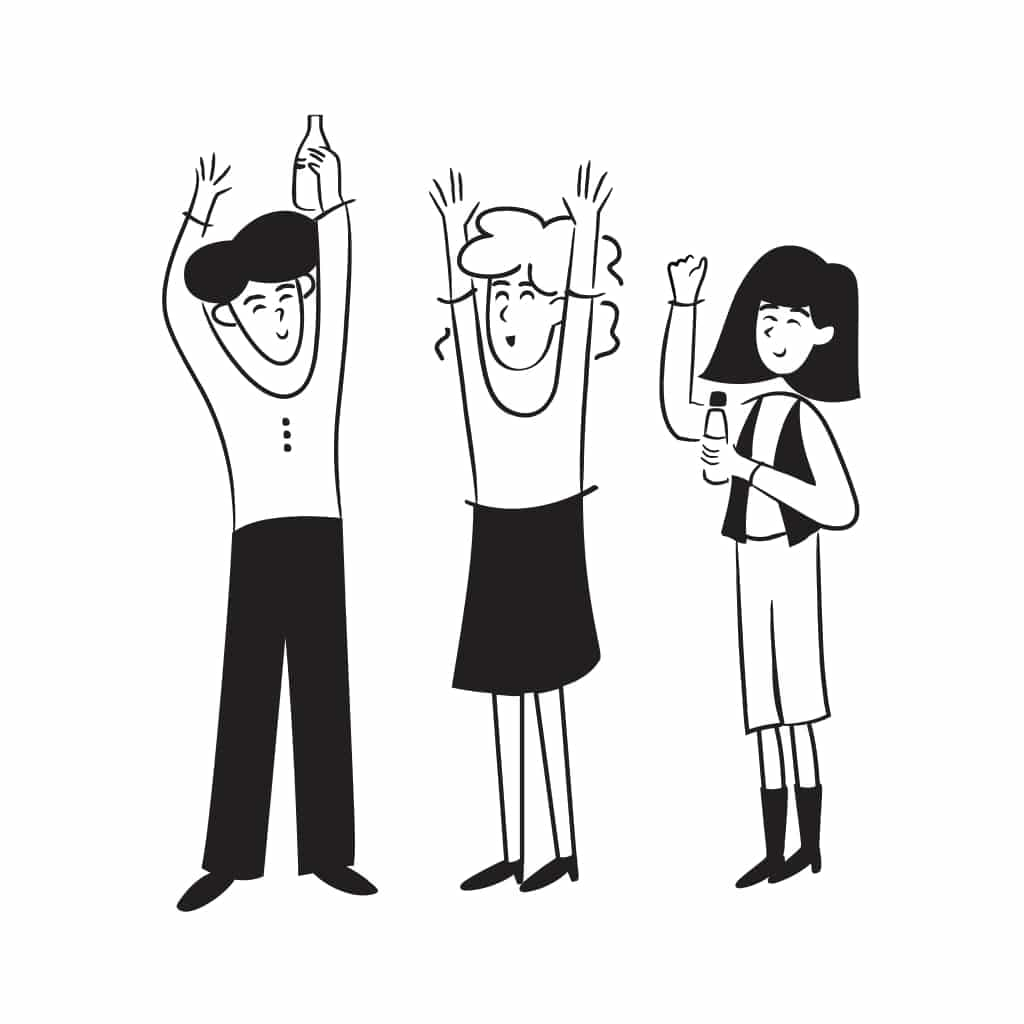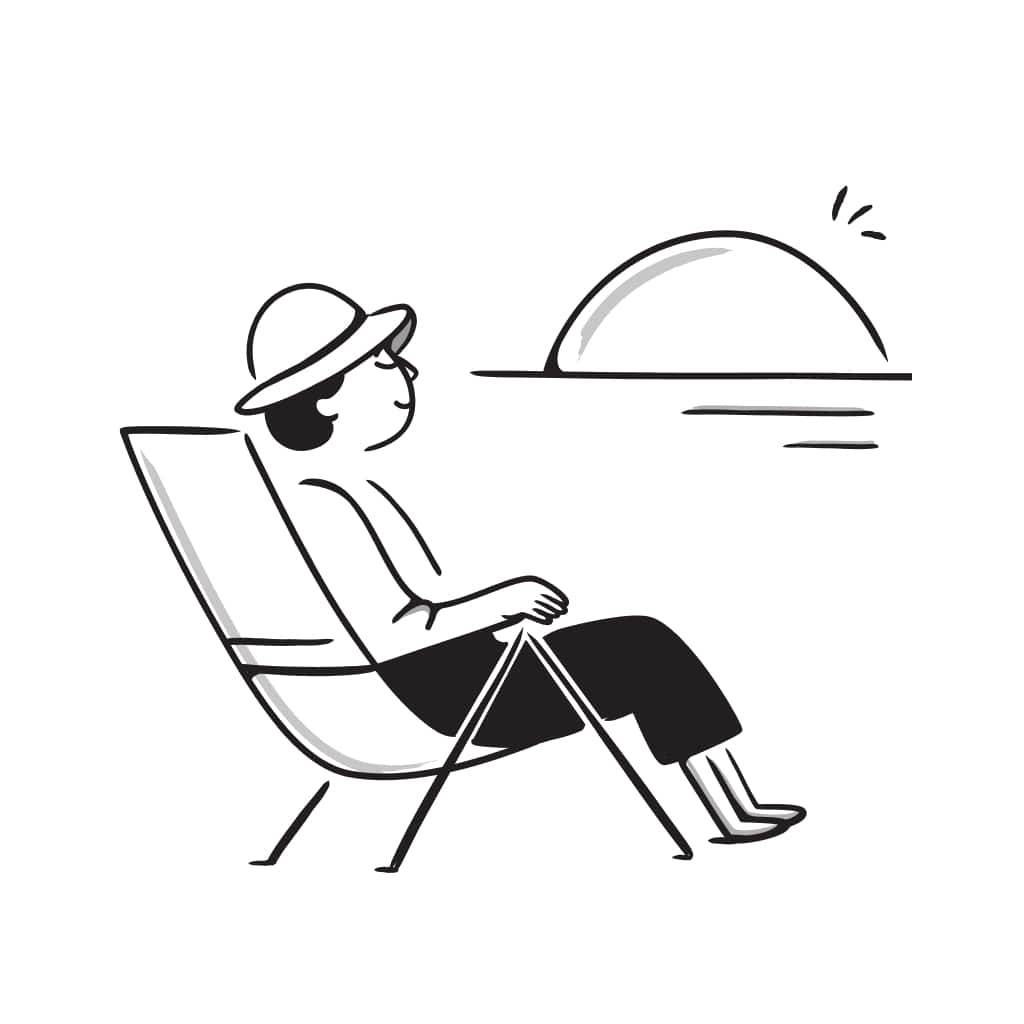This story was designed to help you learn Spanish in context, strengthen comprehension, and absorb vocabulary and grammar naturally through reading, listening, and interactive exercises. It includes a quizz, flashcards, and a writing practice to reinforce your skills. Here's how to maximize your learning:
- Listen and read the story
Play the audio while reading to follow the story naturally. Focus on understanding the main ideas and how the language sounds. The goal is to develop your Spanish listening skills and overall comprehension. - Read again with the translation
Turn on the translation and compare how ideas are expressed in Spanish and English. This builds awareness of Spanish sentence structure and grammar in real use. - Explore the key vocabulary
Below the story, you’ll find important words bolded and listed. This Spanish vocabulary list highlights key words and expressions in context and helps you understand what matters most in the story. - Take the comprehension quiz
Now test your understanding with the quiz. It reinforces the main ideas and helps improve your Spanish reading comprehension with instant feedback. - Review key vocabulary with flashcards
Use the flashcards to practice the vocabulary you just learned. This boosts memory through active recall and strengthens Spanish vocabulary retention. - Try the writing practice
Respond to the writing question related to the story. Use the new words and grammar to create your own sentences. This strengthens grammar and encourages you to think in Spanish. - Practice speaking out loud
Try saying full sentences out loud — or even read the whole story aloud if you feel ready. You can also speak along with the audio, matching the narrator’s voice as closely as possible. This is a great way to improve pronunciation and fluency while building your Spanish speaking confidence. - Review as needed
Come back to the story anytime to review vocabulary, grammar, or anything you found challenging. You can retake the quiz, replay the audio, or go through the flashcards again. Regular review helps reinforce what you’ve learned and build stronger Spanish skills over time.
Key Spanish concepts you'll encounter in this story
Grammar: Imperfect vs. preterite contrast, reported speech in dialogue, reflexive verbs in narrative, sequencing with past events.
Vocabulary: Horse, festival and fair-related words, descriptive adjectives, verbs for movement and action.
Skills: Understanding character motivation, recognizing cause-effect relationships, interpreting cultural traditions, following chronological events.
Spanish version
El fotógrafo Miguel Sánchez llegó en tren a Sevilla un día de sol brillante. Venía desde Madrid para tomar fotos en la feria del Caballo de Jerez, una celebración muy importante donde los caballos son las estrellas.
Miguel alquiló un coche y condujo una hora. Después de un tiempo, vio un cartel que decía: "Finca El Amanecer - Caballos Andaluces".
Giró por un camino de tierra y llegó a una casa blanca. Cerca había un establo y campos donde corrían caballos blancos.
Un hombre mayor salió a saludarlo.
—Buenos días, ¿eres Miguel, el fotógrafo? —preguntó el hombre.
—Sí, soy yo. Vengo para hacer fotos de la feria del Caballo.
—Soy Antonio Jiménez —dijo el hombre dándole la mano—. ¿Primera vez en la feria?
—Primera vez en Andalucía —dijo Miguel—. Vivo en Madrid y allí no estoy acostumbrado a los caballos.
Antonio sonrió.
—Un hombre de ciudad. Te va a gustar nuestra feria. Ven, te voy a enseñar la finca.
—Mi familia tiene caballos andaluces desde hace muchos años —explicó Antonio—. Pero ahora solo quedamos mi nieta Lucía y yo.
Durante la tarde, Miguel sacó sus primeras fotos: caballos blancos bajo el cielo azul.
En el almuerzo, conoció a Lucía, una mujer joven con pelo negro. Mientras comían, hablaron sobre la feria.
—La feria es mañana —dijo Lucía—. Es el día más importante para nosotros. Hay un desfile de caballos por Jerez.
—¿Y todos van en caballo? —preguntó Miguel.
—Sí, con ropa tradicional —respondió Lucía—. ¿Has montado alguna vez?
Miguel dijo que no.
—Soy de ciudad. Solo veo caballos en los parques, para turistas.
—Esta tarde te voy a enseñar algo sobre caballos —dijo Lucía—. Para que entiendas mejor lo que vas a fotografiar mañana.
Después del almuerzo, Lucía llevó a Miguel al establo. Mientras veían los diferentes caballos, Miguel vio una yegua blanca en un lugar separado. Era más grande y bonita que las otras.
—¿Quién es esa? —preguntó a Lucía.
—Es Luna, la mejor yegua de nuestra familia. Viene de los caballos que trajeron los árabes a España hace muchos años —explicó Lucía—. Su sangre es muy pura. Es muy especial para nosotros.
—Yo voy a montar a Luna en el desfile mañana —añadió—. Es tradición que el mejor caballo de cada familia esté en el desfile.
Esa noche, mientras dormía, un ruido despertó a Miguel.
Oyó voces en el establo. Miró por la ventana y vio dos personas moviéndose en la oscuridad.
Sin pensar, Miguel bajó las escaleras sin hacer ruido. Al acercarse al establo, vio a dos hombres tratando de llevarse a Luna.
—¡Alto! —gritó fuerte.
Los hombres se giraron sorprendidos. Con los gritos, los ladrones se asustaron y escaparon.
Las luces de la casa se encendieron y Antonio y Lucía salieron corriendo.
—¿Qué pasa? —preguntó Antonio.
—Dos hombres querían llevarse a Luna —explicó Miguel, nervioso—. Los asusté y se escaparon.
Antonio corrió al establo. Luna estaba nerviosa pero estaba bien.
—Gracias a Dios —dijo el hombre—. Y gracias a ti, Miguel. Es la tercera vez que intentan robar a Luna.
—¿Por qué quieren tanto a Luna? —preguntó Miguel.
—Porque vale mucho dinero —respondió Lucía, acariciando a Luna—. Pero para nosotros es más que dinero.
Por la mañana, todos se prepararon para la feria. Lucía se puso un vestido tradicional. Luna llevaba cintas de colores en el pelo.
Cuando llegaron a Jerez, había mucha gente en las calles. El desfile estaba por comenzar. Familias de toda la región participaban con sus mejores caballos y ropa tradicional.
Durante el día, Miguel disfrutó de la música, el baile y los caballos. Hizo muchas fotos, pero su favorita fue una de Luna con Lucía, las dos elegantes en medio del desfile.
Al día siguiente, Miguel preparaba su viaje de vuelta a Madrid.
—Gracias por todo —dijo a Antonio y Lucía—. Ha sido increíble para este chico de ciudad.
—Tú nos has ayudado más —respondió Antonio—. Sin Luna, la feria no habría sido igual para nosotros.
—Puedes volver cuando quieras —dijo Lucía—. Para la próxima feria o cuando quieras salir de Madrid.
Mientras conducía de vuelta a Sevilla para tomar su tren, Miguel pensaba en lo diferente que era esta vida de la suya en Madrid.
Su artículo ahora tenía algo especial: no solo fotos bonitas, sino una historia real sobre tradiciones que siguen vivas y personas que las cuidan.
Spanish story with English translation
El fotógrafo Miguel Sánchez llegó en tren a Sevilla un día de sol brillante.
Photographer Miguel Sánchez arrived by train in Seville on a bright, sunny day.
Venía desde Madrid para tomar fotos en la feria del Caballo de Jerez, una celebración muy importante donde los caballos son las estrellas.
He came from Madrid to take photos at the Horse Fair in Jerez, a very important celebration where the horses are the stars.
Miguel alquiló un coche y condujo una hora. Después de un tiempo, vio un cartel que decía: "Finca El Amanecer - Caballos Andaluces".
Miguel rented a car and drove for an hour. After a while, he saw a sign that read: "Finca El Amanecer - Andalusian Horses."
Giró por un camino de tierra y llegó a una casa blanca. Cerca había un establo y campo donde corrían caballos blancos.
He turned onto a dirt road and arrived at a white house. Nearby, there was a stable and a field where white horses ran.
Un hombre mayor salió a saludarlo.
An older man came out to greet him.
—Buenos días, ¿eres Miguel, el fotógrafo? —preguntó el hombre.
"Good morning, are you Miguel, the photographer?" the man asked.
—Sí, soy yo. Vengo para hacer fotos de la feria del Caballo.
"Yes, I am. I came to take photos of the Horse Fair."
—Soy Antonio Jiménez —dijo el hombre dándole la mano—. ¿Primera vez en la feria?
"I'm Antonio Jiménez," the man said, shaking his hand. "First time at the fair?"
—Primera vez en Andalucía —dijo Miguel—. Vivo en Madrid y allí no estoy acostumbrado a los caballos.
"First time in Andalusia," said Miguel. "I live in Madrid, and there I'm not used to horses."
Antonio sonrió.
Antonio smiled.
—Un hombre de ciudad. Te va a gustar nuestra feria. Ven, te voy a enseñar la finca.
"A city man. You're going to like our fair. Come, I'll show you the estate."
—Mi familia tiene caballos andaluces desde hace muchos años —explicó Antonio—. Pero ahora solo quedamos mi nieta Lucía y yo.
"My family has had Andalusian horses for many years," Antonio explained. "But now, only my granddaughter Lucía and I remain."
Durante la tarde, Miguel sacó sus primeras fotos: caballos blancos bajo el cielo azul.
During the afternoon, Miguel took his first photos: white horses under the blue sky.
En el almuerzo, conoció a Lucía, una mujer joven con pelo negro. Mientras comían, hablaron sobre la feria.
At lunch, he met Lucía, a young woman with black hair. While they ate, they talked about the fair.
—La feria es mañana —dijo Lucía—. Es el día más importante para nosotros. Hay un desfile de caballos por Jerez.
"The fair is tomorrow," said Lucía. "It's the most important day for us. There's a horse parade through Jerez."
—¿Y todos van en caballo? —preguntó Miguel.
"And does everyone go on horseback?" Miguel asked.
—Sí, con ropa tradicional —respondió Lucía—. ¿Has montado alguna vez?
"Yes, with traditional clothing," Lucía replied. "Have you ever ridden?"
Miguel dijo que no.
Miguel said no.
—Soy de ciudad. Solo veo caballos en los parques, para turistas.
"I'm from the city. I only see horses in parks, for tourists."
—Esta tarde te voy a enseñar algo sobre caballos —dijo Lucía—. Para que entiendas mejor lo que vas a fotografiar mañana.
"This afternoon I'm going to teach you something about horses," said Lucía. "So you can better understand what you're going to photograph tomorrow."
Después del almuerzo, Lucía llevó a Miguel al establo. Mientras veían los diferentes caballos, Miguel vio una yegua blanca en un lugar separado. Era más grande y bonita que las otras.
After lunch, Lucía took Miguel to the stable. While they looked at the different horses, Miguel saw a white mare in a separate place. She was bigger and more beautiful than the others.
—¿Quién es esa? —preguntó a Lucía.
"Who is that?" he asked Lucía.
—Es Luna, la mejor yegua de nuestra familia. Viene de los caballos que trajeron los árabes a España hace muchos años —explicó Lucía—. Su sangre es muy pura. Es muy especial para nosotros.
"That's Luna, the best mare in our family. She comes from the horses that the Arabs brought to Spain many years ago," Lucía explained. "Her bloodline is very pure. She's very special to us."
—Yo voy a montar a Luna en el desfile mañana —añadió—. Es tradición que el mejor caballo de cada familia esté en el desfile.
"I'm going to ride Luna in the parade tomorrow," she added. "It's tradition that the best horse from each family is in the parade."
Esa noche, mientras dormía, un ruido despertó a Miguel.
That night, while he was sleeping, a noise woke Miguel up.
Oyó voces en el establo. Miró por la ventana y vio dos personas moviéndose en la oscuridad.
He heard voices in the stable. He looked out the window and saw two people moving in the darkness.
Sin pensar, Miguel bajó las escaleras sin hacer ruido. Al acercarse al establo, vio a dos hombres tratando de llevarse a Luna.
Without thinking, Miguel went down the stairs quietly. As he approached the stable, he saw two men trying to take Luna away.
—¡Alto! —gritó fuerte.
"Stop!" he shouted loudly.
Los hombres se giraron sorprendidos. Con los gritos, los ladrones se asustaron y escaparon.
The men turned around, surprised. With the shouting, the thieves got scared and ran away.
Las luces de la casa se encendieron y Antonio y Lucía salieron corriendo.
The house lights turned on, and Antonio and Lucía came running out.
—¿Qué pasa? —preguntó Antonio.
"What's going on?" Antonio asked.
—Dos hombres querían llevarse a Luna —explicó Miguel, nervioso—. Los asusté y se escaparon.
"Two men were trying to take Luna," Miguel explained, nervous. "I scared them, and they ran away."
Antonio corrió al establo. Luna estaba nerviosa pero estaba bien.
Antonio ran to the stable. Luna was nervous but fine.
—Gracias a Dios —dijo el hombre—. Y gracias a ti, Miguel. Es la tercera vez que intentan robar a Luna.
"Thank God," the man said. "And thanks to you, Miguel. This is the third time they've tried to steal Luna."
—¿Por qué quieren tanto a Luna? —preguntó Miguel.
"Why do they want Luna so much?" Miguel asked.
—Porque vale mucho dinero —respondió Lucía, acariciando a Luna—. Pero para nosotros es más que dinero.
"Because she's worth a lot of money," Lucía replied, stroking Luna. "But for us, she's more than just money."
Por la mañana, todos se prepararon para la feria. Lucía se puso un vestido tradicional. Luna llevaba cintas de colores en el pelo.
In the morning, everyone got ready for the fair. Lucía put on a traditional dress. Luna had colorful ribbons in her mane.
Cuando llegaron a Jerez, había mucha gente en las calles. El desfile estaba por comenzar.
When they arrived in Jerez, there were many people in the streets. The parade was about to begin.
Familias de toda la región participaban con sus mejores caballos y ropa tradicional.
Families from all over the region participated with their best horses and traditional clothing.
Durante el día, Miguel disfrutó de la música, el baile y los caballos.
Throughout the day, Miguel enjoyed the music, the dancing, and the horses.
Hizo muchas fotos, pero su favorita fue una de Luna con Lucía, las dos elegantes en medio del desfile.
He took many photos, but his favorite was one of Luna with Lucía, both elegant in the middle of the parade.
Al día siguiente, Miguel preparaba su viaje de vuelta a Madrid.
The next day, Miguel was preparing for his trip back to Madrid.
—Gracias por todo —dijo a Antonio y Lucía—. Ha sido increíble para este chico de ciudad.
"Thank you for everything," he said to Antonio and Lucía. "It has been incredible for this city guy."
—Tú nos has ayudado más —respondió Antonio—. Sin Luna, la feria no habría sido igual para nosotros.
"You have helped us more," Antonio replied. "Without Luna, the fair wouldn’t have been the same for us."
—Puedes volver cuando quieras —dijo Lucía—. Para la próxima feria o cuando quieras salir de Madrid.
"You can come back whenever you want," Lucía said. "For the next fair or whenever you want to get away from Madrid."
Mientras conducía de vuelta a Sevilla para tomar su tren, Miguel pensaba en lo diferente que era esta vida de la suya en Madrid.
As he drove back to Seville to catch his train, Miguel thought about how different this life was from his in Madrid.
Su artículo ahora tenía algo especial: no solo fotos bonitas, sino una historia real sobre tradiciones que siguen vivas y personas que las cuidan.
His article now had something special: not just beautiful photos, but a real story about traditions that are still alive and the people who preserve them.
Master A1 Spanish with 120+ stories
Start using Spanish in real life with our complete story-based course.
Join the waitlist for exclusive early-bird pricing.
Join waitlist

























Comments section for language learners